Amid intense political and diplomatic activity ahead of Sunday’s crucial European summit, British prime minister Theresa May travels to Brussels on Saturday to finalise the agreements on which she has staked her political future and the relationship between the European Union and the UK.
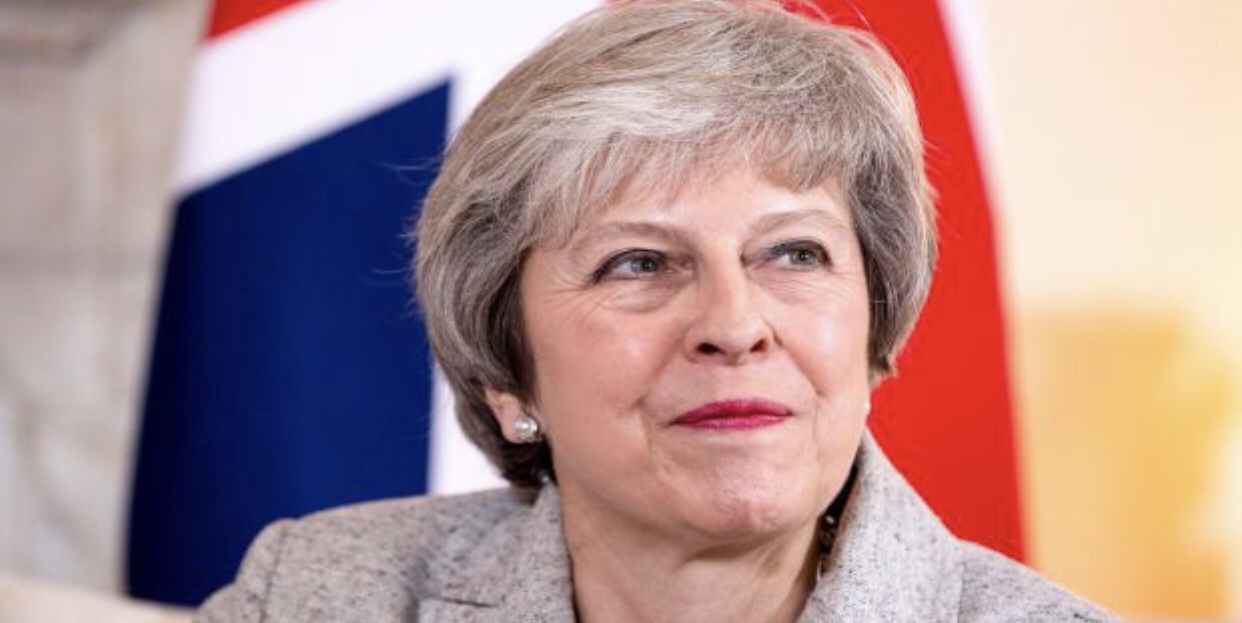
Senior political and official sources in Dublin and Brussels said on Friday night that they expected the summit to adopt both the withdrawal treaty – the legally binding document that will govern the UK’s exit if ratified by the European and British parliaments – and the declaration on the future relationship between the UK and the EU.
On Friday, at a meeting in Brussels of the “sherpas” – the personal representatives of the national leaders – the texts of both agreements were regarded as settled, according to authoritative sources.
A Spanish threat to derail the summit appeared to have been averted by agreement among officials to language which reaffirms Madrid’s veto over future UK-EU talks impinging on Gibraltar.
The sherpas agreed to a clarification statement by the 27 remaining EU states, which will not be part of the withdrawal agreement or the political declaration, though initial responses in Madrid were sceptical. But no more than Mrs May, Spanish prime minister Pedro Sanchez will not be allowed by his fellow EU leaders to reopen the agreed treaty text, Brussels sources said.
Mrs May will be in Brussels on Saturday to meet the president of the European Commission, Jean-Claude Juncker, and the president of the Council – the group of EU leaders that meets on Sunday – Donald Tusk.
On Friday, Mrs May took her pitch to the British people over the airwaves, telling the BBC: “I don’t think they [the EU 27] will come to us and say we’ll get a better deal” if the British parliament votes down the deal.
Taoiseach Leo Varadkar said at a meeting in Sligo that his expectation was that the EU would be able to sign off on the withdrawal agreement on Sunday. He said there was an issue in relation to Spain “but I am confident that can be worked out”.
Mr Varadkar also spoke to Mr Juncker on Friday to inform him that the Dáil had approved the withdrawal agreement and that the Government was happy with the text of the future relationship declaration.
Mr Varadkar told reporters in Sligo that if the withdrawal treaty was approved, it would ensure that “there won’t be any changes at all for these two years, if not longer, giving businesses time to prepare and also gives us time to negotiate a future relationship”.
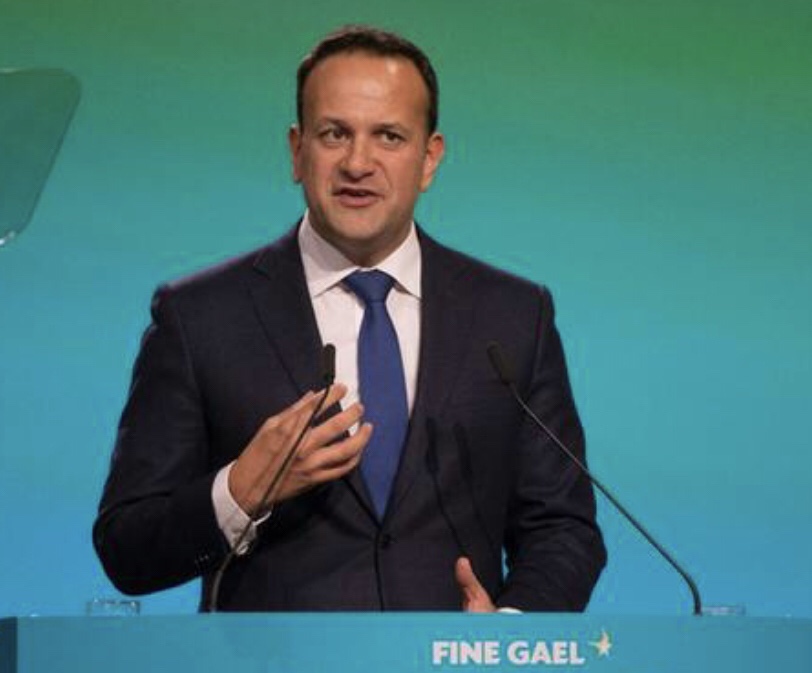
The Taoiseach said that lots of people “may be criticising this but I don’t see anyone putting anything better on the table”.
Minister for Foreign Affairs Simon Coveney also spoke to new British Brexit secretary Stephen Barclay by phone on Friday.
In Northern Ireland, the DUP’s party conference will be addressed on Saturday by arch-Brexiteer Boris Johnson, who will urge the party to maintain its opposition to the withdrawal treaty when it comes before the House of Commons for a vote in the coming weeks.
On Friday night the British chancellor of the exchequer Philip Hammond addressed a party dinner appealing for support for the deal. But on Saturday DUP leaders will again stress their opposition, warning Mrs May that DUP support for her government was in question if she continued with the present deal.
Several sources said that with the treaty and declaration texts agreed, EU leaders would seek to assist Mrs May when they meet in Brussels on Sunday morning. “They’ll avoid any triumphalism, avoid a long meeting – just get the business done,” said one source.
Source: Irish Times
It would be easy to be distracted by the stramash at Westminster but it is worth the odd glance at events in Geneva to realise that the breathless drama in London might well be entirely pointless. After all it is in the sleepy Swiss city, not London, that the Brexiters have promised Britannia will once again launch herself as a totally independent and glorious trading state.
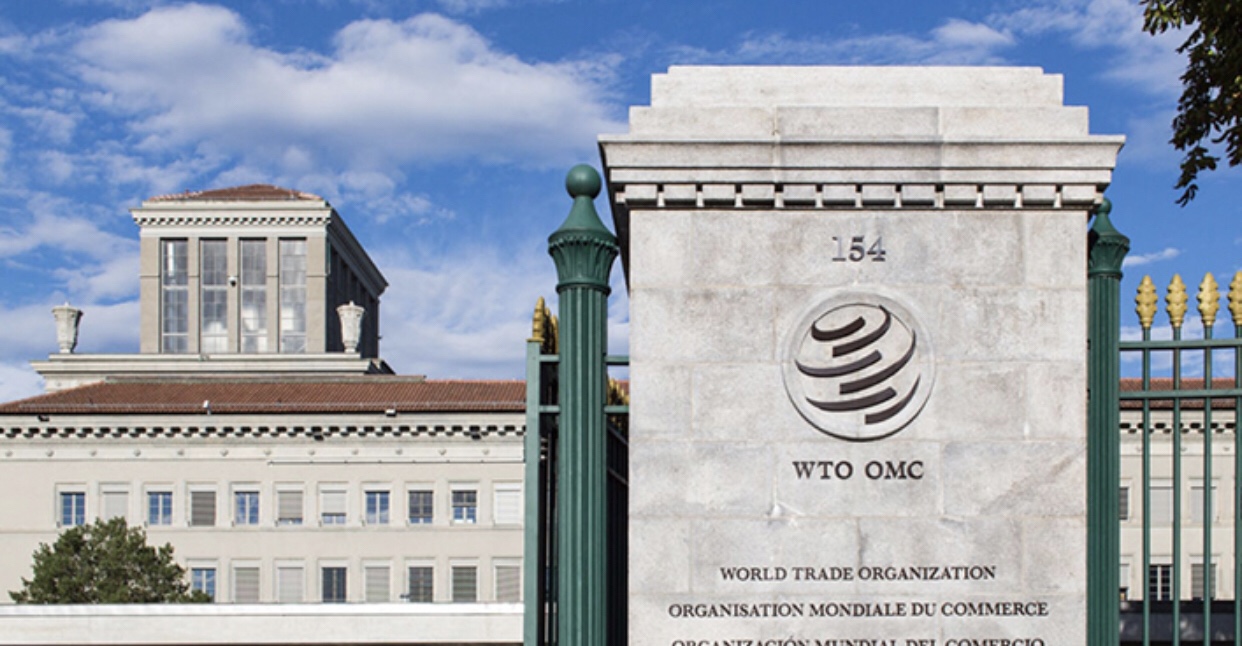
Sadly, a bit like everything else to do with Brexit, it is demonstrably not going to plan. This matters because the Brexiters’ Plan B (“We’ll just revert to WTO terms”) is as unfit for purpose as their Plan A.
A few months back the EU and UK each filed documents in Geneva outlining the terms on which they propose to trade with the rest of the world, assuming the UK leaves the EU. This matters because although the UK will indeed be a member of the World Trade Organisation (WTO) automatically, the terms and conditions of that membership still need to be worked out given that for decades the UK Schedule has been incorporated within the EU Schedule. No member can begin to negotiate trade deals until it has clarity over what it actually has to trade, as written down in its independent Schedule.
The EU also needs to update its Schedule once the UK has left and has decided to renegotiate with the WTO’s 136 other countries directly. All of these countries will have their own agenda and this will take time but it is a tried and tested method the EU negotiators are well used to. The EU is also not in a rush, given its Schedule continues until replaced by the new agreed one.
Conversely, the UK is in an almighty hurry and has decided to do it differently. It will use a 1980 procedure known as a “technical rectification” to create its Schedule. The risk in using this method is that it can be challenged by any, or all, of the other WTO members for any reason.
Guess what? In a staggering development foreseen by literally everybody except Liam Fox, at the end of October countries began to challenge. Russia was first, saying that the UK proposals do not match its obligations. Specifically they complain that since the EU’s Schedule is still being negotiated from the 2013 accession of Croatia (an indication of how long these processes last) it is not possible to know how the Schedule should be rectified to produce the UK’s.
Russia is not alone and it is reported that a further 19 countries have already informally raised objections.
This escalated just last week when tiny insignificant economies like Argentina, Australia, Brazil, Canada, China, Mexico, New Zealand, Paraguay, Taiwan, Thailand, the US and Uruguay joined the fun. They signed a joint document demanding the establishment of a mechanism to provide “appropriate compensation” to ensure they do not end up worse off from the establishment of the UK’s schedules.
Is this the real crisis in Brexit? Yes it is. The WTO is the arbiter of international trade and the UK is not on the starting grid. Instead of doing the work, Dr Fox tried to find a quick fix and it has failed, and until it is resolved the legendary magical trade deals he and the rest have promised – surely, the only real win from Brexit – can’t even start. All the sound and fury signifies nothing.
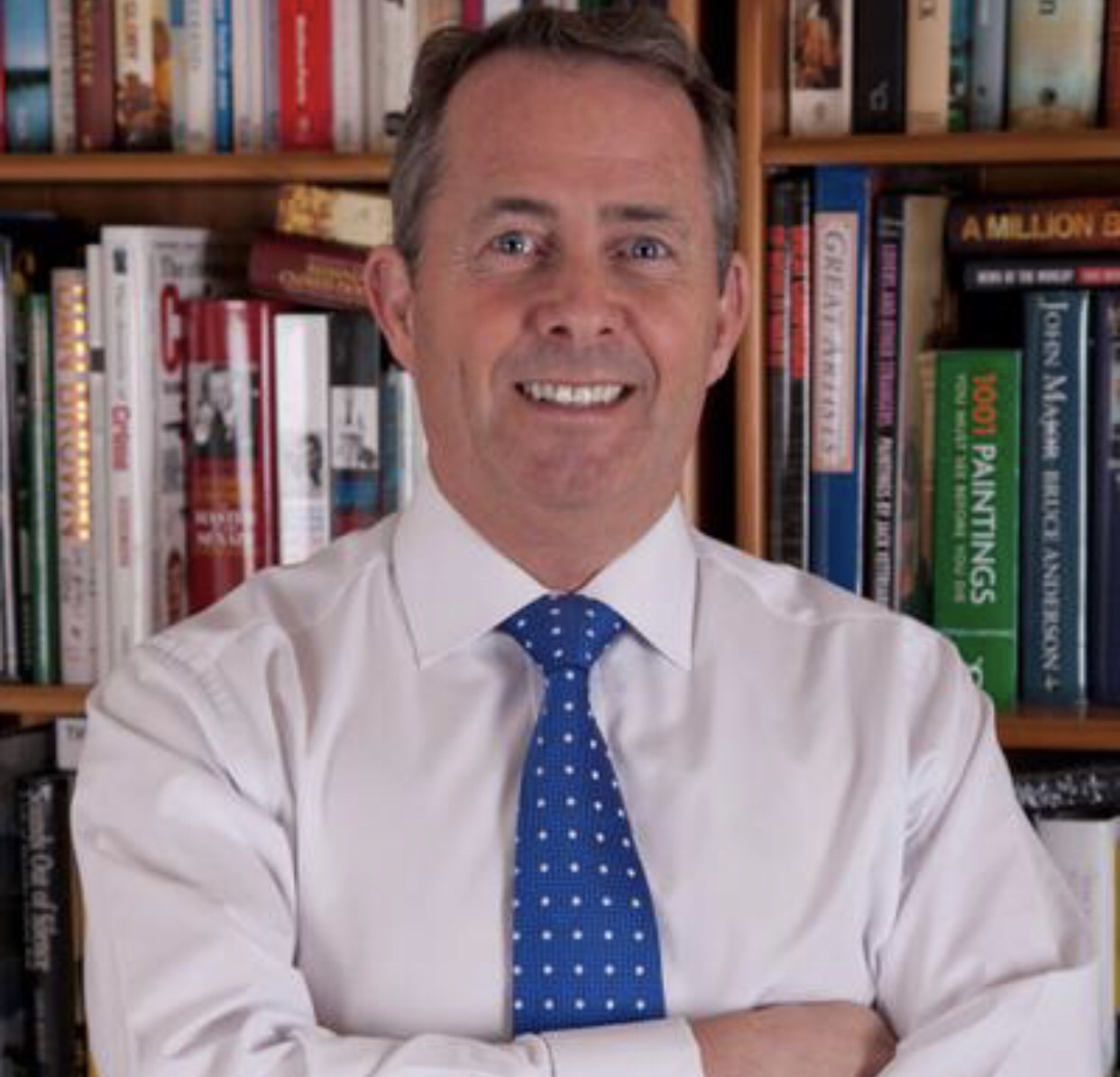
Trade is about interests not sentiment, and nobody is going to give us something for nothing. As I have said before: if you didn’t like Brussels, just wait till you meet Geneva.
Source: The Herald
EU and UK has now presented the Brexit Political Declaration.
A few points to remember…
This is not a legally binding document.
It’s not very long either, but it has grown from last week’s seven-page outline to 26 pages. It sits alongside the 585-page Draft Withdrawal Agreement (which will be legally binding if it gets ratified).
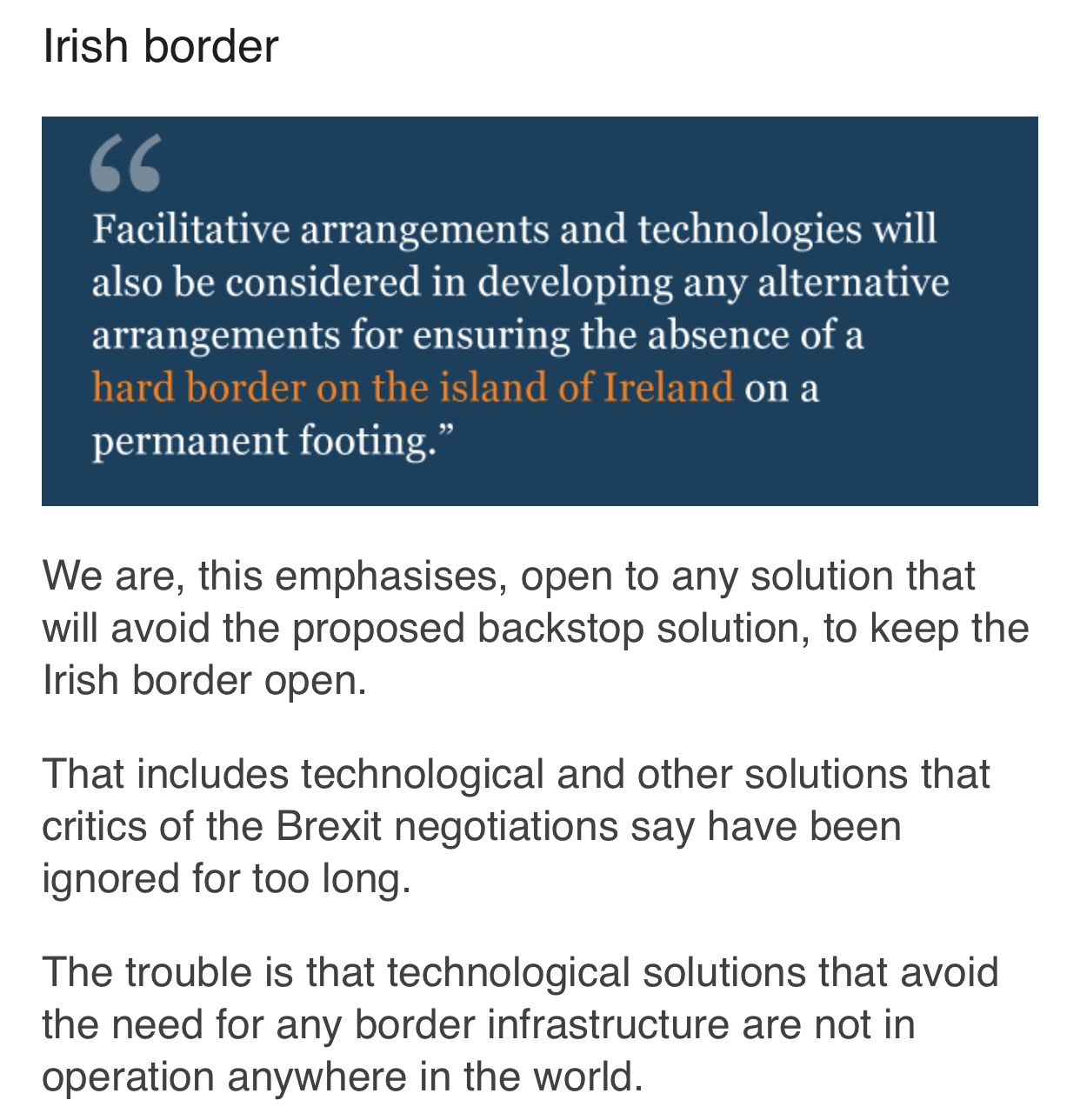
This is also a draft, agreed by negotiators, but it still needs to be approved by the leaders of all 28 EU countries at a summit scheduled to take place on Sunday. Don’t expect major changes.
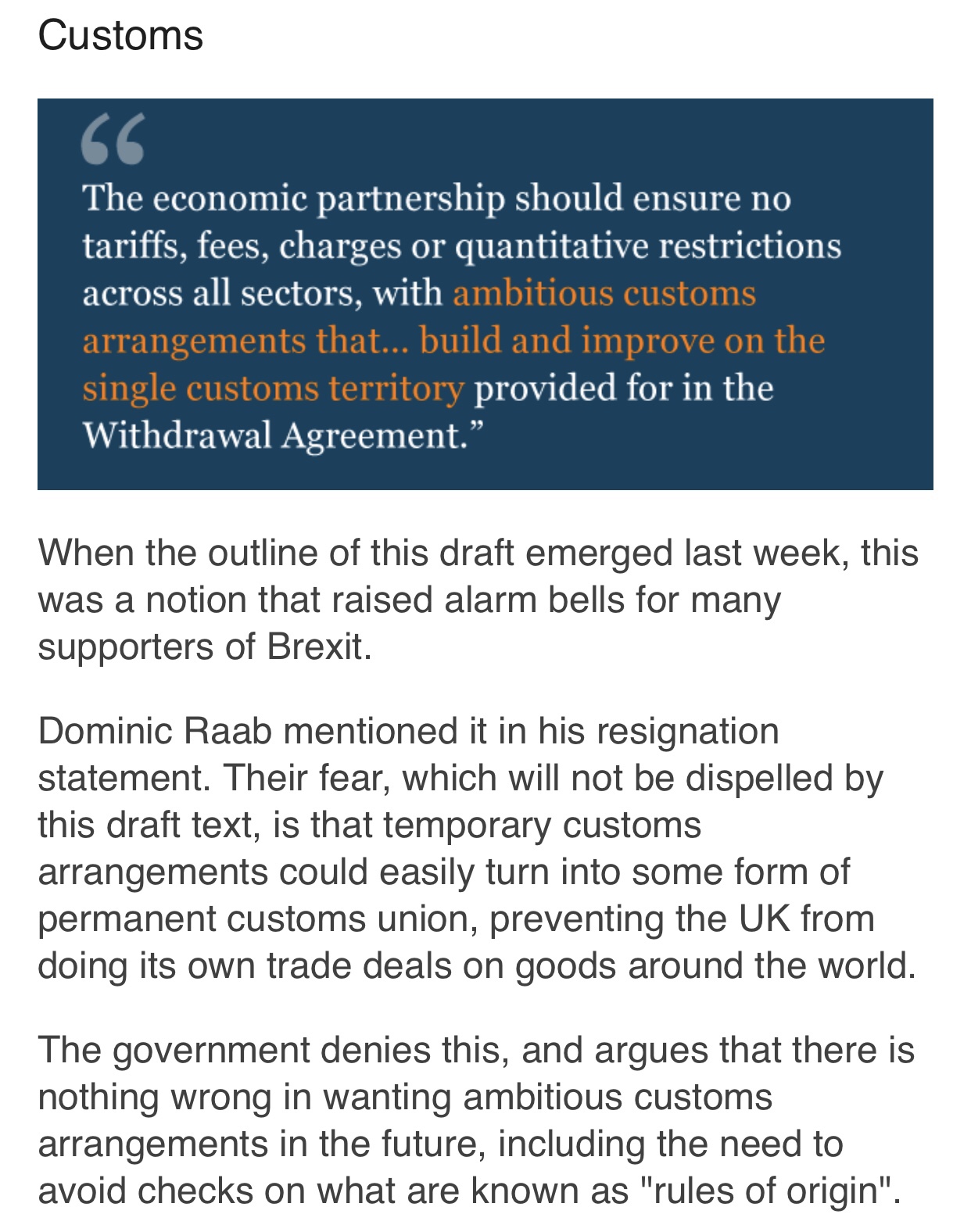
Formal negotiations on everything it contains can only begin after Brexit has actually happened – currently after 29 March 2019.
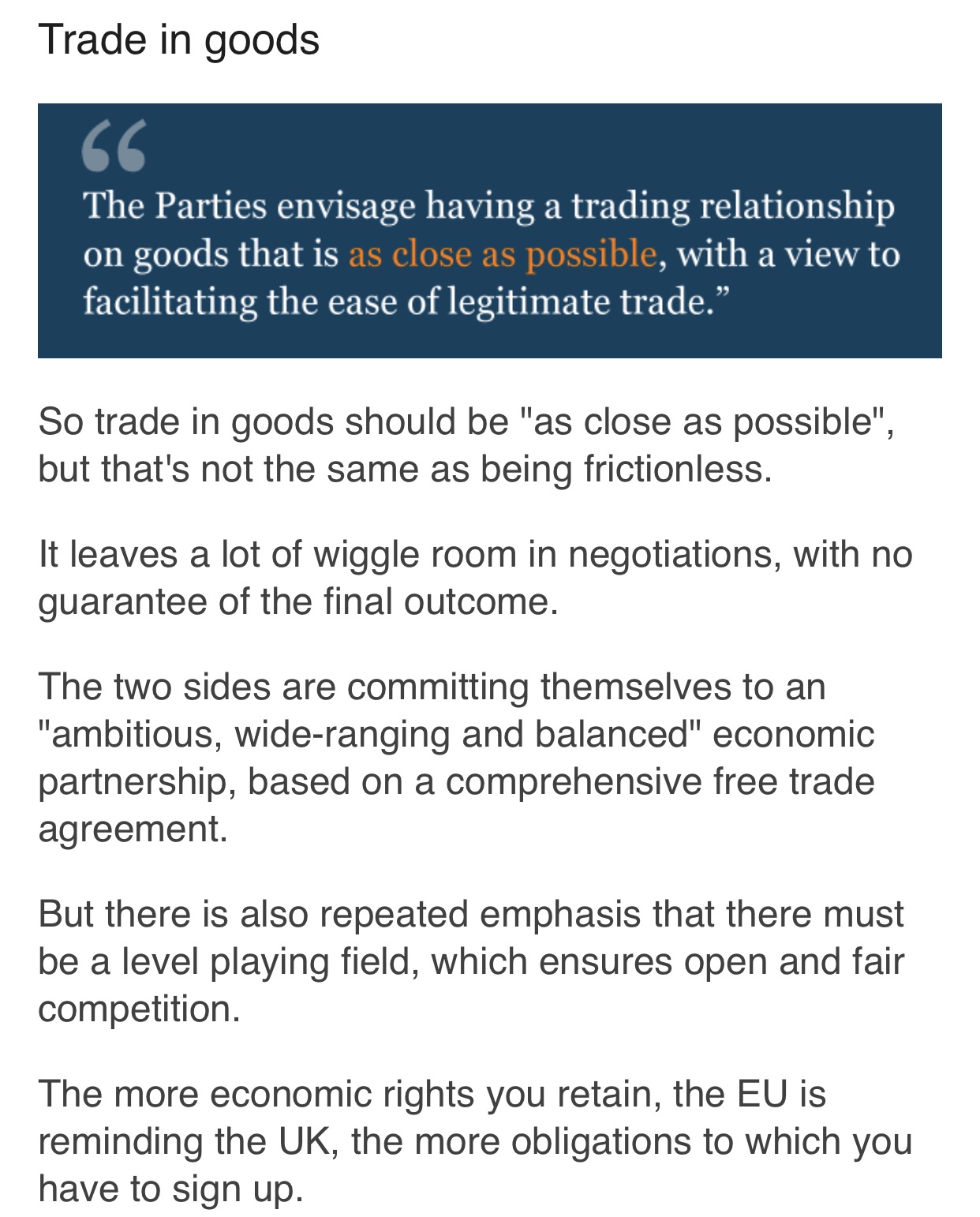
It contains plenty of aspirations involving shared interests, close partnerships and ambitious co-operation, but many of the details are still to come.






You must be logged in to post a comment.